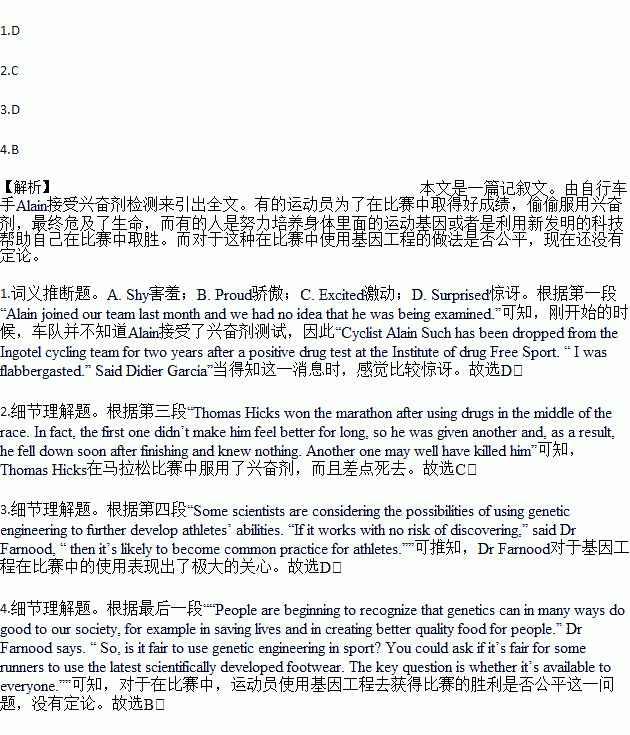题目内容
Cyclist Alain Such has been dropped from the Ingotel cycling team for two years after a positive drug test at the Institute of drug Free Sport. “ I was flabbergasted.” Said Didier Garcia, from Team Ingotel. “Alain joined our team last month and we had no idea that he was being examined.”
It’s a story that has become more and more familiar in recent years. Dr. Mohammad Farnood, a leading sports scientist from Cairo, Egypt, said, “ It is thought that some athletes will look for other ways to improve performance in addition to using drugs.”
However, it has not always been against the law. In the Olympics in 1904, Thomas Hicks won the marathon after using drugs in the middle of the race. In fact, the first one didn’t make him feel better for long, so he was given another and, as a result, he fell down soon after finishing and knew nothing. Another one may well have killed him.
Things are very different today. Some scientists are considering the possibilities of using genetic engineering to further develop athletes’ abilities. “If it works with no risk of discovering,” said Dr Farnood, “ then it’s likely to become common practice for athletes.”
Researchers are looking at the possibility of identifying “athletic” genes and correcting weak ones. Put into practice, this would make a person healthier and stronger. Once scientists understand what genes of top athletes look like , it might even become possible to identify “athletic” genes in young people, and then money could be spent on children who have the most promising genes.
“People are beginning to recognize that genetics can in many ways do good to our society, for example in saving lives and in creating better quality food for people.” Dr Farnood says. “ So, is it fair to use genetic engineering in sport? You could ask if it’s fair for some runners to use the latest scientifically developed footwear. The key question is whether it’s available to everyone.”
1.What does the underlined word “ flabbergasted” in Paragraph 1 mean ?
A. Shy . B. Proud.
C. Excited. D. Surprised.
2.What happened to Thomas Hicks in 1904 ?
A. He was badly hurt in training.
B. He broke the law when running in a race.
C. He took drugs and almost got killed.
D. He lost the match in the Olympic Games.
3.Who may show the greatest concern about using genetic engineering in sport ?
A. Didier Garcia .
B. Thomas Hicks.
C. Cyclist Alain Such .
D. Dr Mohammad Farnood.
4.What can we learn from Paragraph 5 and 6 ?
A. The possibility of identifying “athletic” genes has become available .
B. It’s not clear whether it is fair to use genetic engineering in sport.
C. The practice of using drugs in sport has a long history.
D. It’s dangerous to use drugs in sport.


 D. less
D. less